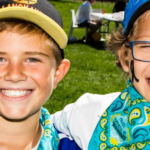
Coolangatta Marches For a Cure!
Melanoma March will return to Coolangatta for the fourth year in 2018, starting at The Strand at Coolangatta on Sunday 4 March as part of the annual campaign to raise funds and awareness for a cure for melanoma.
An initiative of the Melanoma Institute Australia (MIA), this year the national fundraiser will support the Institute’s Big Data for Melanoma Project – a nationwide register to ensure the best care and treatment can be achieved for people with melanoma around the country.
Over the past three years, over $60,000 in Coolangatta which is helping to improve the survival rates as a result of on-going research projects.
South-East Queensland still has one of the highest rates of melanoma diagnosis in the country. Early detection is vital, and this annual event is a reminder to our local community to take this cancer seriously.
This year, Melanoma March Coolangatta will be held in memory of Tweed resident Jenelle Foggo who passed away from her battle with melanoma in November 2017.
March participants can wear a brightly coloured arm band or Melanoma March bandana to march in honour of Jenelle and other locals affected by melanoma.
Following the march, Jenelle’s husband, Dave Killion, will be shaving his head on the day to raise additional funds for melanoma research through Melanoma Institute Australia. Donations can be made online at https://mm2018-coolangatta.gofundraise.com.au/page/JenelleFoggo1
Melanoma March Coolangatta will commence at The Strand on Marine Parade at 7:00am (registration from 6:30am) and take a picturesque 4km loop along the foreshore of Coolangatta Beach, turning at Point Danger with participants encouraged to walk, march, stroll or even run the course.
Registrations and donations for Melanoma March Coolangatta can be made online now at www.melanomamarch.org.au
FACTS ABOUT MELANOMA:
- One Australian dies from melanoma every five hours. On average, 14,000 Australians are diagnosed with melanoma every year.
- Melanoma is the most common cancer affecting 15 to 39 year old Australians and kills more 20 to 39 year olds than any other single cancer
- Melanoma is the most serious form of skin cancer, and early detection is vital. It can occur anywhere on the skin, even in areas that receive little or no sun exposure eg. soles of the feet.
- Up to one third of melanomas are detected by someone other than the person affected eg. a friend, partner or family member
